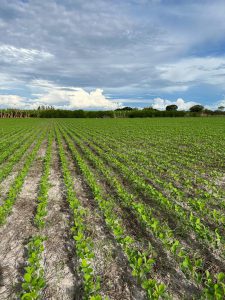Initiatives that seek technological and sustainable solutions to rural issues are increasing in Brazil. Among the agribusiness startups, the agtechs that are beginning to gain prominence are Dioxd and VisionFarm. Both were selected by the Brazilian incubator Cyklo for its one-year acceleration program.
Dioxd is the result of a school scientific initiation research that started wrong. Back in 2013, João Américo Macori Barboza was given the task to develop a project for his school science fair. “I told the teacher I wanted to solve the issue of air pollution,” he remembers. João spent months working on a catalyst for factory chimneys, but the results were always unsatisfactory. “I was frustrated that my friends were advancing their research and I wasn’t. One day, we were learning about the process of plant respiration and photosynthesis and I had a click. I thought: ‘Man, that’s it. I’m going to get the carbon dioxide that is in the lab and I’m going to give it to the plants.”

Instead of supplying the leaves with CO2, João decided to build an underground pipeline to deliver the gas directly to the plants’ roots. It worked well and all tests had positive results. From that on, he began new researches, talked to university professors, and mostly with his teachers and his parents. It was his father who had the idea to start treating the seeds with CO2.
In 2018, João, his father, and his mother launched the Dioxd startup, which is focused on the improvement of seeds using combined gases. “Today, we have results that prove that the treatment using a total of five gases, with a higher concentration of CO2, maintains the quality of the seeds and increases the productivity up to 12%,” says João. The product has been commercially validated for soybeans and beans, and it is currently being tested on corn, wheat, signal grass, and cotton.
The 21-year-old CEO highlights that the technology has no contraindications and is completely sustainable since it uses gases that exist in the atmosphere. “The difference is the methodology. We use a set of sensors to analyze the seeds’ atmosphere, to know how it is and so that it receives the ideal volume [of gas].”
Today, Dioxd has clients in the states of Mato Grosso do Sul, São Paulo, Paraná, Goiás, Minas Gerais, Bahia, and Piauí. Producers from Paraguay and Bolivia are also treating their seeds with the product.
Integrated pest management
Aiming to develop technology and innovation for agribusiness based on integrated management systems, VisionFarm has developed an app called Cyklope. The tool can recognize, through digital images, weeds and insects that most frequently threaten the cultivation of large crops. By doing that, the app optimizes response time and minimizes wasting natural and financial resources, resulting in sustainability for the entire production chain.

“The user in the field will be able to take a photo of the weed or insect and the app will help with its identification, saying what it is and recognizing it by AI,” explains Ulisses Remy, CMO at VisionFarm. “In the app, the user will be able to register the farm and its cultures, and each photo collected for analysis will generate a point with the geographic coordinates, georeferencing that that analysis was located there.”
Controlling pests and diseases is crucial to agriculture. A study carried out in 2016 by CEPEA/ESALQ involving corn, soy, and cotton crops indicates that the attack of pests not controlled by pesticides can represent an average loss ranging from 10.4% to 43% of production. However, the problem doesn’t end there. Several pests can build resistance to pesticides, causing the chemical control to lose its effect. The result is a more intense use of chemicals, greater expenses, and a loss that can reach R$ 9 billion (around US$ 1,6 billion) to Brazilian agribusiness.
The app’s initial area of operation is in Matopiba, a region that gathers the Brazilian states of Maranhão, Tocantins, Piauí, and Bahia, but the developers think that it can be replicated anywhere in the world.